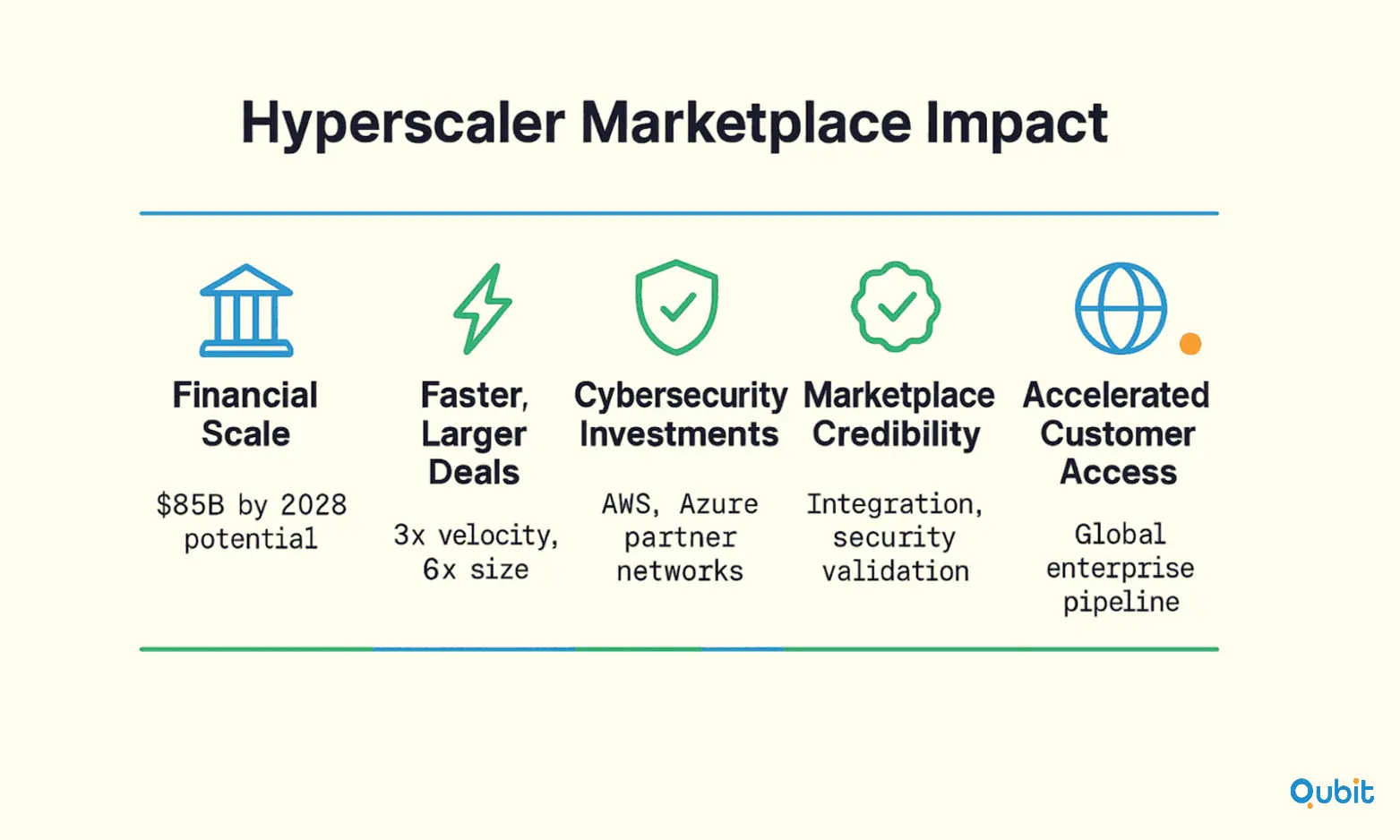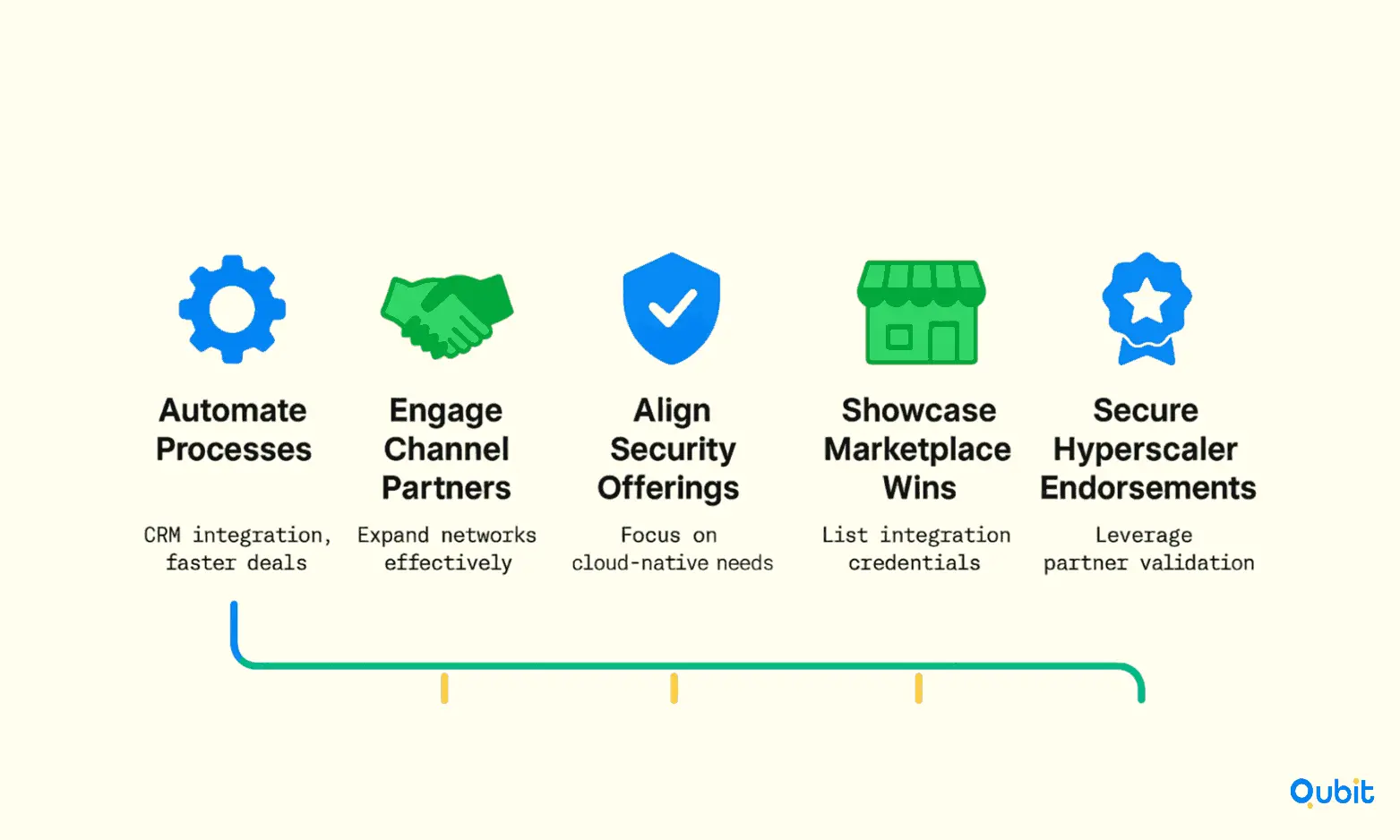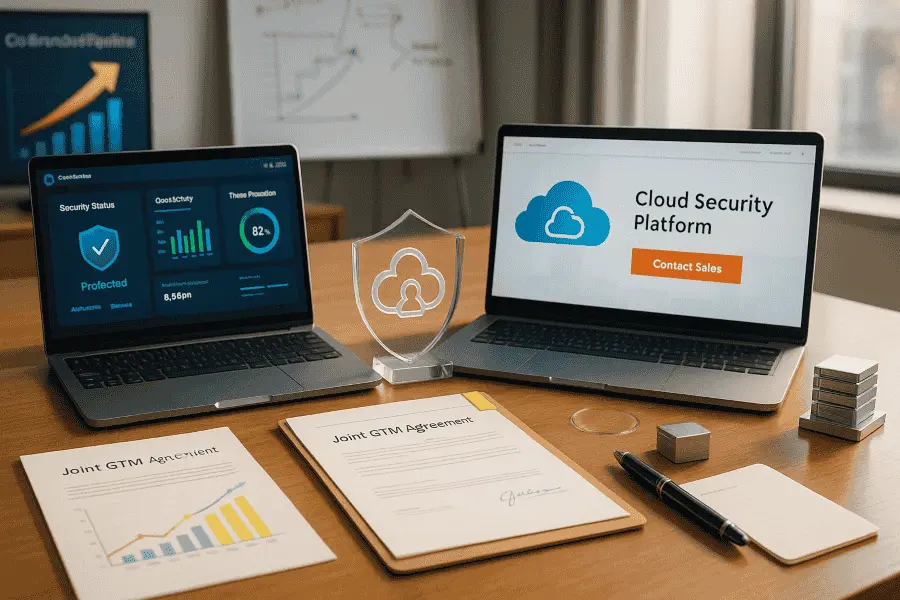Collaborating with hyperscalers has become a pivotal strategy for cloud-security startups aiming to scale their operations and secure investments. Co-selling with hyperscalers not only opens doors to expansive customer networks but also enhances credibility in a competitive market.
Hyperscaler cloud marketplaces like Microsoft Azure, AWS, and Google Cloud are reshaping the cybersecurity landscape by fostering dynamic marketplace partnerships. These ecosystems are not only driving significant investments in cloud security but also enabling businesses to achieve faster and larger deal closures through co-selling strategies. An overview of raising capital cloud network security startups broadens the financial context, enriching your perspective on funding approaches within the cloud-security sector.
This article explores how startups can harness these partnerships to drive growth and attract cloud-security investment.
Let’s jump right in!
How Hyperscalers Are Transforming Marketplace Partnerships

1. Financial Scale of Co-Selling Channels
The financial potential of hyperscaler marketplaces is immense. Enterprise software sales through these platforms are projected to reach $85 billion by 2028. This projection underscores the growing reliance on hyperscaler ecosystems for scalable revenue generation.
2. Performance Benefits of Co-Selling
Microsoft Azure’s co-selling model demonstrates the efficiency of hyperscaler partnerships. Deals facilitated through Azure co-selling close three times faster and are six times larger compared to traditional sales channels.This metric highlights the transformative impact of co-selling on deal velocity and size.
3. Cybersecurity Investments by Hyperscalers
Leading hyperscalers like Microsoft and Amazon Web Services are heavily investing in cybersecurity acquisitions to secure their cloud environments. Microsoft, for instance, has emerged as a critical partner in the co-selling ecosystem, while AWS is building robust cybersecurity partner networks to enhance marketplace collaboration.
Practical Strategies for Co-Selling Success

1. Automate Co-Sell Processes
Manual submission of co-sell opportunities can be time-consuming. Abnormal Security addressed this challenge by implementing WorkSpan’s Co-Sell App, which automated CRM-to-Microsoft PartnerCenter synchronization. This reduced submission time from one week per month to just one hour, increasing deal velocity 15x.
2. Collaborate with Channel Partners
Channel partners play a pivotal role in accelerating deal closures. By aligning sales strategies with these partners, businesses can tap into established networks and expertise, ensuring smoother and faster transactions.
3. Focus on Cloud-Security Solutions
Given the hyperscalers’ emphasis on cybersecurity, aligning your offerings with cloud-security solutions can enhance your marketplace visibility. This alignment not only meets market demand but also strengthens your position within the hyperscaler ecosystem.
SASE and Zero-Trust investors focus on specific KPIs. For more insights into metrics that investors prioritize in cybersecurity platforms, explore sase zero trust cybersecurity investment metrics.
Data-Driven Signals for Fundraising Success
Why Hyperscaler Collaboration Attracts Investors
Credibility and Trust
Partnering with hyperscalers signals strong technical rigor and product-market fit to investors. Solutions listed on AWS, Azure, or GCP marketplaces must meet stringent security and integration requirements, functioning as an informal “stamp of approval.” This can help early- and growth-stage startups stand out in a crowded funding environment.
Market Access & Accelerated Customer Acquisition
Co-selling unlocks access to a global base of enterprise customers—startups often report pipeline growth and deal velocity that would be impossible to achieve through direct sales alone. Investors recognize this path as a practical lever for scalable, predictable ARR growth—a key driver in recent large capital raises by top startups.
Synergistic Go-To-Market (GTM) Motions
Many VCs favor teams with proven hyperscaler GTM experience, as these startups can demonstrate lower customer acquisition cost, high conversion rates, and partnerships with large account teams. This track record is increasingly mentioned in Series A/B fundraising pitch decks and cited by analysts as a predictor of outsized market performance
As the cybersecurity market continues to expand, staying informed about these trends is essential for businesses aiming to remain competitive. For startups looking to capitalize on these opportunities, our cybersecurity startup fundraising guide offers a comprehensive framework for aligning with hyperscaler co-selling strategies.
Investor Perspective: What They Look For
Investor sentiment remains bullish on cloud security, with VC funding rising 35% YoY in 2024 and continuing strong in 2025 despite broader market caution. What distinguishes top startups in this cycle is their ability to:
- Automate integration and co-selling workflows to accelerate expansion without overwhelming headcount growth.
- Build differentiated IP around cloud-native security, rather than retrofitting legacy tools, and prove it in production through hyperscaler partnerships.
- Balance ARR growth with capital efficiency, showing investors that marketplace-influenced revenue is predictable, margin-accretive, and scalable.
Investors also scrutinize:
- Depth of integration with hyperscaler APIs and partner portals (not just listing, but seamless SaaS deployment).
- Participation in featured hyperscaler programs (e.g., Microsoft’s IP Co-Sell, AWS Partner Network Advanced Tier).
- Evidence of multi-cloud adaptability to guard against hyperscaler dependency risk.
Latest Investment and Fundraising Trends
Despite economic headwinds, early-stage cybersecurity venture rounds remain robust, making up 62% of all 2025 funding events. However, investors are setting a higher bar: they look for startups with hyperscaler momentum, as these are more likely to scale efficiently and secure significant late-stage backing or strategic exits.
According to recent reports, the total addressable market for cloud security continues to expand rapidly, projected to reach $156.25 billion by 2032, with investment clustering on companies that solve for multi-cloud protection, automated threat detection, and compliance at scale.
Practical Guidance: Maximizing Fundraising Through Hyperscaler Partnership
- Showcase Marketplace Metrics: Highlight annual recurring revenue sourced through hyperscaler marketplaces and deal velocity improvements in investor updates and fundraising materials.
- Secure Hyperscaler Endorsements: Where possible, present testimonials/case studies from hyperscaler sales leaders or cloud solution architects.
- Participate in Co-Innovation Programs: Engage with joint innovation labs or accelerator programs run by AWS, Microsoft, or Google Cloud to validate roadmaps and gain added investor visibility.
- Integrate Cloud-Native Security Tools: Adoption of next-gen monitoring (e.g. Datadog), posture management, and AI-driven automation further de-risks the business in the eyes of investors.
- Align with Risk-Based Security Investment: Demonstrate how your co-sell strategy prioritizes high-value, at-risk customers—showing targeted, efficient GTM motions.
Current Market News Worth Noting
Several high-profile rounds in 2025 were led or co-led by hyperscaler venture arms (e.g., Microsoft’s M12, Google Ventures), particularly for startups with clear evidence of marketplace traction and co-sell success. These lead investments often act as a catalyst, bringing additional institutional capital and lifting valuations during competitive rounds.
Startups able to quickly implement, document, and demonstrate successful hyperscaler partnerships are often featured in annual “top startups to watch” lists, further amplifying both customer and investor interest
Conclusion
Partnering with hyperscalers offers startups a unique opportunity to scale their operations while benefiting from robust cloud-security investment. Throughout this article, we’ve explored strategies to enhance co-selling efforts, emphasizing the importance of clear, narrative-driven messaging. By aligning your goals with hyperscalers and utilizing data-driven insights, you can significantly accelerate deal velocity and foster stronger partnerships.
If you're ready to transform your co-selling approach and secure the investments your startup needs, our Fundraising Assistance service can help you reach new heights. Let us guide you toward success.
Key Takeaways
- Hyperscalers are significantly investing in cybersecurity, creating abundant co-selling opportunities.
- Effective marketplace partner strategies can accelerate deal closures and increase deal sizes.
- Real-world examples, such as Abnormal Security’s case study, demonstrate the tangible benefits of automation in co-selling.
- Channel partner engagement and in-person interactions remain crucial for successful co-selling.
- Utilizing expert services from Qubit Capital can help startups secure vital cloud-security investments.
Frequently asked Questions
What is co-selling with hyperscalers?
Co-selling with hyperscalers refers to collaborating with leading cloud providers such as Microsoft, AWS, and Google. This partnership enables companies to jointly market and sell cybersecurity solutions, benefiting from the hyperscalers’ extensive networks and market influence.






